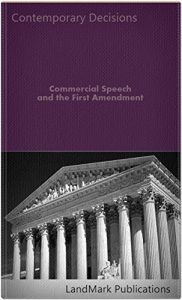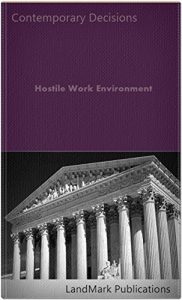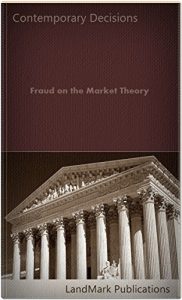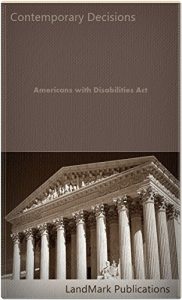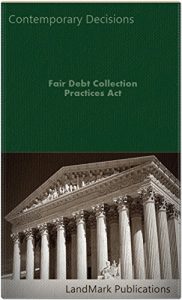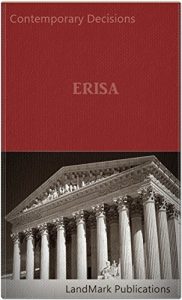THIS CASEBOOK contains a selection of 180 U. S. Court of Appeals decisions that analyze, interpret and apply commercial speech doctrine under the First Amendment. The selection of decisions spans from 2004 to the date of publication.
[T]he test for laws that burden commercial speech [are] set forth in Central Hudson Gas & Electric Corp. v. Public Service Commission of New York, 447 U.S. 557, 100 S.Ct. 2343, 65 L.Ed.2d 341 (1980). Under that test, courts examine four questions: (1) whether the speech concerns lawful activity and is not misleading; (2) whether the asserted governmental interest justifying the regulation is substantial; (3) whether the regulation directly advances the governmental interest asserted; and (4) whether the regulation is not more extensive than is necessary to serve that interest. Id. at 566, 100 S.Ct. 2343. Retail Digital Network, LLC v. Appelsmith, 810 F. 3d 638 (9th Cir. 2016).
[T]he Supreme Court defines commercial speech as that "which does 'no more than propose a commercial transaction.'" Va. State Bd. of Pharmacy, 425 U.S. at 762, 96 S.Ct. 1817 (quoting Pittsburgh Press Co. v. Pittsburgh Comm'n on Human Relations, 413 U.S. 376, 385, 93 S.Ct. 2553, 37 L.Ed.2d 669 (1973)). Such speech has long been given less protection under the First Amendment than other types of speech. United States v. United Foods, Inc., 533 U.S. 405, 409, 121 S.Ct. 2334, 150 L.Ed.2d 438 (2001); Valle Del Sol Inc. v. Whiting, 709 F.3d 808, 818 (9th Cir.2013). Specifically, restrictions on commercial speech have been subject to intermediate scrutiny under the four-part test set forth in Central Hudson, 447 U.S. at 566, 100 S.Ct. 2343. The burden is on the government to show that the elements of the test are satisfied. 44 Liquormart, 517 U.S. at 504-05, 116 S.Ct. 1495 (opinion of Stevens, J.). Consistent with Central Hudson, we [apply] intermediate scrutiny to content-based and content-neutral regulations of commercial speech alike. See, e.g., Coyote Publ'g, Inc. v. Miller, 598 F.3d 592, 599 n. 10 (9th Cir.2010) ("[W]hether or not the . . . regulation is content-based, the Central Hudson test still applies because of the reduced protection given to commercial speech."). Retail Digital Network, LLC v. Appelsmith, ibid.
In Sorrell, however, the Supreme Court held that content or speaker-based restrictions on non-misleading commercial speech regarding lawful goods or services must survive "heightened judicial scrutiny." 131 S.Ct. at 2664. The Court invalidated a Vermont law that restricted the sale, disclosure, and use of pharmacy records for marketing purposes. Id. at 2659. On its face, the law was content-and speaker-based. In fact, it had been enacted with the avowed purpose of "diminish[ing] the effectiveness of marketing by manufacturers of brand-name drugs." Id. at 2663. While the Court found that heightened judicial scrutiny of the law was required, the Court did not actually apply heightened scrutiny, as it found that the law could not withstand intermediate scrutiny under Central Hudson. Id. at 2667-68. Retail Digital Network, LLC v. Appelsmith, ibid.
[ ] Sorrell modified the Central Hudson test for laws burdening commercial speech. Under Sorrell, courts must first determine whether a challenged law burdening non-misleading commercial speech about legal goods or services is content-or speaker-based. If so, heightened judicial scrutiny is required. See Sorrell, 131 S.Ct. at 2664. Retail Digital Network, LLC v. Appelsmith, ibid.
[T]he test for laws that burden commercial speech [are] set forth in Central Hudson Gas & Electric Corp. v. Public Service Commission of New York, 447 U.S. 557, 100 S.Ct. 2343, 65 L.Ed.2d 341 (1980). Under that test, courts examine four questions: (1) whether the speech concerns lawful activity and is not misleading; (2) whether the asserted governmental interest justifying the regulation is substantial; (3) whether the regulation directly advances the governmental interest asserted; and (4) whether the regulation is not more extensive than is necessary to serve that interest. Id. at 566, 100 S.Ct. 2343. Retail Digital Network, LLC v. Appelsmith, 810 F. 3d 638 (9th Cir. 2016).
[T]he Supreme Court defines commercial speech as that "which does 'no more than propose a commercial transaction.'" Va. State Bd. of Pharmacy, 425 U.S. at 762, 96 S.Ct. 1817 (quoting Pittsburgh Press Co. v. Pittsburgh Comm'n on Human Relations, 413 U.S. 376, 385, 93 S.Ct. 2553, 37 L.Ed.2d 669 (1973)). Such speech has long been given less protection under the First Amendment than other types of speech. United States v. United Foods, Inc., 533 U.S. 405, 409, 121 S.Ct. 2334, 150 L.Ed.2d 438 (2001); Valle Del Sol Inc. v. Whiting, 709 F.3d 808, 818 (9th Cir.2013). Specifically, restrictions on commercial speech have been subject to intermediate scrutiny under the four-part test set forth in Central Hudson, 447 U.S. at 566, 100 S.Ct. 2343. The burden is on the government to show that the elements of the test are satisfied. 44 Liquormart, 517 U.S. at 504-05, 116 S.Ct. 1495 (opinion of Stevens, J.). Consistent with Central Hudson, we [apply] intermediate scrutiny to content-based and content-neutral regulations of commercial speech alike. See, e.g., Coyote Publ'g, Inc. v. Miller, 598 F.3d 592, 599 n. 10 (9th Cir.2010) ("[W]hether or not the . . . regulation is content-based, the Central Hudson test still applies because of the reduced protection given to commercial speech."). Retail Digital Network, LLC v. Appelsmith, ibid.
In Sorrell, however, the Supreme Court held that content or speaker-based restrictions on non-misleading commercial speech regarding lawful goods or services must survive "heightened judicial scrutiny." 131 S.Ct. at 2664. The Court invalidated a Vermont law that restricted the sale, disclosure, and use of pharmacy records for marketing purposes. Id. at 2659. On its face, the law was content-and speaker-based. In fact, it had been enacted with the avowed purpose of "diminish[ing] the effectiveness of marketing by manufacturers of brand-name drugs." Id. at 2663. While the Court found that heightened judicial scrutiny of the law was required, the Court did not actually apply heightened scrutiny, as it found that the law could not withstand intermediate scrutiny under Central Hudson. Id. at 2667-68. Retail Digital Network, LLC v. Appelsmith, ibid.
[ ] Sorrell modified the Central Hudson test for laws burdening commercial speech. Under Sorrell, courts must first determine whether a challenged law burdening non-misleading commercial speech about legal goods or services is content-or speaker-based. If so, heightened judicial scrutiny is required. See Sorrell, 131 S.Ct. at 2664. Retail Digital Network, LLC v. Appelsmith, ibid.
